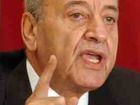Lebanon's navy and U.N. peacekeepers on Saturday rescued more than 200 migrants from a boat sinking in the Mediterranean Sea hours after it left northern Lebanon's coast, the military said in a statement. Two migrants were killed in the incident.
 Full Story
Full Story
A political decision has been taken to call for a caretaker cabinet session in the beginning of the new year, a media report said on Saturday.
 Full Story
Full Story
Parliament Speaker Nabih Berri has said that he will not call anew for dialogue over the presidential file, stressing that “consensus” is essential for the election of a new president.
 Full Story
Full Story
A televised speech by Hezbollah chief Sayyed Hassan Nasrallah scheduled for Friday evening has been postponed for “health reasons,” Hezbollah’s media relations department said.
 Full Story
Full Story
Parliament Speaker Nabih Berri has called in front of his visitors for sidelining Free Patriotic Movement chief Jebran Bassil in the presidential file and “moving to Plan B,” a media report said on Friday.
“Plan B is based on seriously promoting the presidential nomination of Marada Movement chief Suleiman Franjieh with the beginning of the new year,” informed sources told ad-Diyar newspaper.
 Full Story
Full Story
Caretaker Prime Minister Najib Mikati on Friday pledged to continue carrying out his “duties” despite any “obstructions or difficulties.”
“We hope the new year will be the start of Lebanon’s exit from the stifling crisis it is going through,” Mikati said, during an end-of-the-year meeting with the premiership’s employees.
 Full Story
Full Story
A Hezbollah commander and his bodyguard, both Lebanese, were killed when Hayat Tahrir al-Sham militants targeted their military vehicle with a guided missile in Aleppo’s western countryside, the Syrian Observatory for Human Rights said on Friday.
The attack also killed a Syrian national.
 Full Story
Full Story
At a time the Lebanese were expecting French President Emmanuel Macron to visit the country, French Defense Minister Sébastien Lecornu will arrive in Beirut in the coming hours, a media report said.
While in Lebanon Lecornu will spend New Year’s Eve with the French troops and will inspect some French sites and projects in the country, al-Joumhouria newspaper reported on Friday.
 Full Story
Full Story
Gunshots hit al-Jadeed TV’s building overnight in Beirut’s Cola area, in the third attack against the TV network in four days.
“Heavy gunfire was heard in the channel’s vicinity and security forces guarding the building since several days said it was hit by several gunshots,” al-Jadeed said.
 Full Story
Full Story
A fresh war of words has broken out between caretaker Prime Minister Najib Mikati and the Free Patriotic Movement over signatures related to governmental decrees.
In a statement issued overnight, the FPM accused Mikati of “staging an act of forgery and using forgery in the issuance of unconstitutional and illegal decrees that contravene the National Pact,” charging that the premier has forged the signatures of the ministers of social affairs and defense on two decrees.
 Full Story
Full Story



